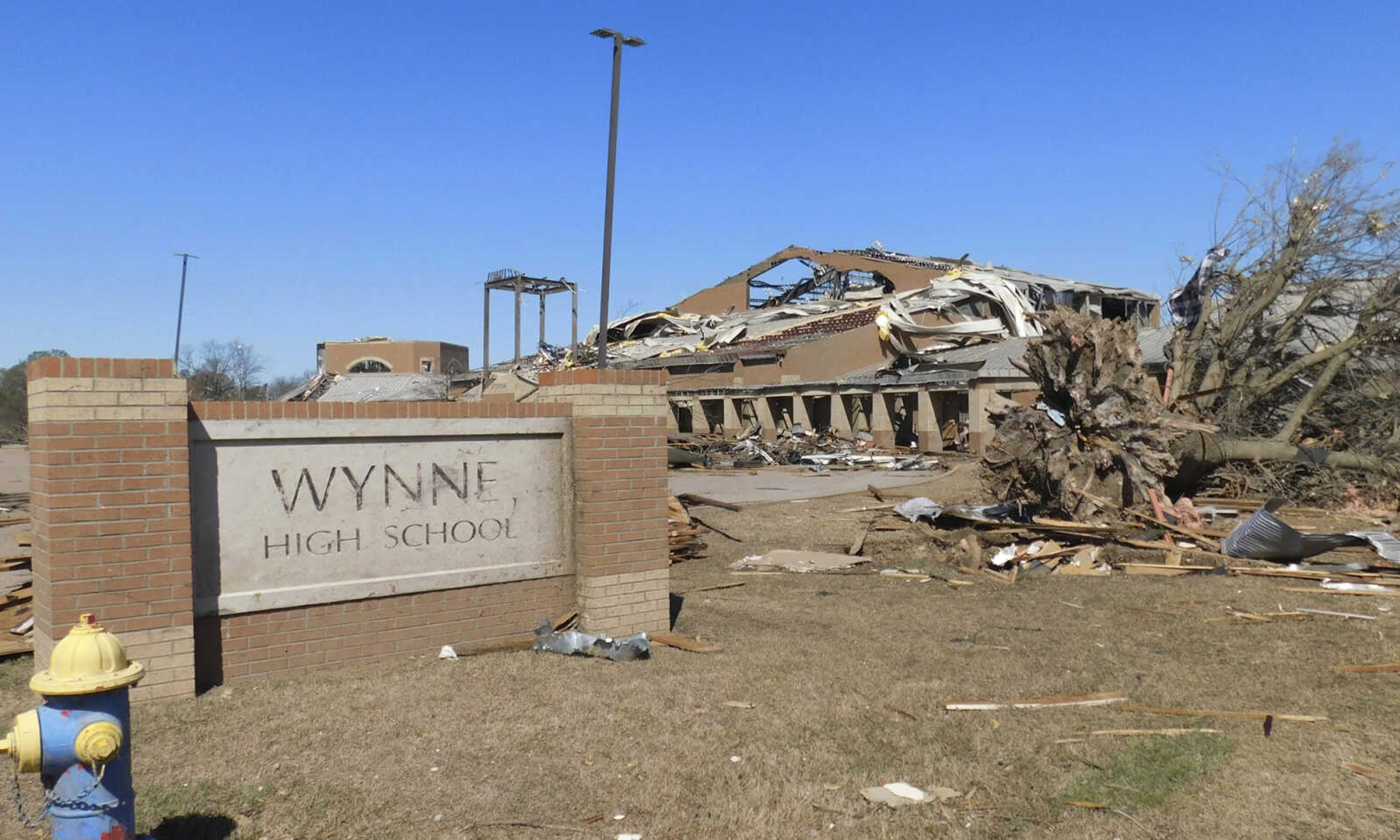More severe weather forecast for battered South, Midwest
OKLAHOMA CITY -- While residents across parts of the South and Midwest pummeled by deadly storms and wildfires sifted through the wreckage of their homes Monday, forecasters warned of more severe weather and fire danger in the days ahead across much of the same region...
OKLAHOMA CITY -- While residents across parts of the South and Midwest pummeled by deadly storms and wildfires sifted through the wreckage of their homes Monday, forecasters warned of more severe weather and fire danger in the days ahead across much of the same region.
The fierce storms that spawned tornadoes in 11 states killed at least 32 people as the system that began Friday plodded through Arkansas and traveled northeast through the South and into the Midwest and Northeast.
Here's a look at the severe storms over the weekend and what's expected in the days ahead:
WILDFIRE DANGER REMAINS HIGH
On the western side of the storm lines that developed Friday were extremely dry conditions in Oklahoma that combined with high winds to fuel several large wildfires that forced interstate closures and sent residents fleeing from their homes.
More than 40 homes were destroyed across Oklahoma, including 30 in an area near the town of Guthrie, about 30 miles north of Oklahoma City, where firefighters had urged residents to evacuate.
With their eyes burning and the heat of the flames circling them, Jessica Garinger and her family ran around their 10-acre property with hoses Friday to save their family home built by Garinger's great-grandfather in Guthrie.
"The wind was so terrible it was just like a blowtorch, and once we would get certain areas put out it would just reignite," she said.
While neighbors evacuated, Garinger said her father, Jim, did not want to leave behind his cherished home, so she and her sister raced to help him. With the help of firefighters, they fought the flames until about 2 a.m., leaving with blisters, scrapes and small burns. Several of the homes nearby burned down.
"It's a miracle that we were able to save the property," Garinger said.
The threat of fire danger remains high Tuesday across portions of far western Oklahoma, the Texas Panhandle, northeast New Mexico and far southeastern Colorado, with low humidity, dry vegetation and wind gusts expected up to 70 mph, according to the National Weather Service.
MORE SEVERE WEATHER FORECAST
Forecasters say more severe weather is forecast for Tuesday afternoon and evening across parts of Arkansas, Missouri into southeastern Iowa and west central Illinois.
"That could initially start as isolated supercells with all hazards possible -- tornadoes, wind and hail -- and then over time typically they form into a line (of thunderstorms) and continue moving eastward," said Ryan Bunker, a meteorologist with the National Weather Center in Norman, Oklahoma.
The same conditions that fueled last week's storms -- an area of low pressure combined with strong southerly winds -- will make conditions ideal for another round of severe weather Tuesday into early morning Wednesday, Bunker said.
Those conditions, which typically include dry air from the west going up over the Rockies and crashing into warm, moist air from the Gulf of Mexico, are what make the U.S. so prone to tornadoes and other severe storms.
DEADLY STORMS BEGAN IN ARKANSAS
Arkansas was among the first states hit by the severe weather Friday when a tornado dropped from the sky and tore through the state's capital, Little Rock, destroying homes and businesses, splintering trees and tossing vehicles. At least five people were killed in Arkansas, including four deaths in the rural community of Wynne, about 50 miles west of Memphis, Tennessee.
Tennessee recorded at least 15 deaths, including nine fatalities in McNairy County, east of Memphis, said Patrick Sheehan, director of the Tennessee Emergency Management Agency.
Elsewhere, Illinois Gov. J.B. Pritzker traveled Sunday to Belvidere to visit the Apollo Theatre, which partially collapsed as about 260 people were attending a heavy metal concert, resulting in at least one death. The governor said 48 others were treated in hospitals, with five in critical condition.
National Weather Service survey teams that earlier confirmed the presence of tornados in New Jersey and Delaware over the weekend said Monday that a tornado also touched down in Pennsylvania. The tornados were generated as a line of severe thunderstorms crossed the region Saturday night. Forecasters said one EF-1 tornado with peak wind speeds of 95 to 105 mph touched down in Wrightstown and traveled almost 4 miles to Newtown in Bucks County.
Four other storms were confirmed in New Jersey and one in Delaware, where a person was found dead in a heavily damaged home. The Delaware Emergency Management Agency said it was the first tornado-related death in the state in 40 years.
Nationwide, there were more than 800 severe weather reports over the weekend, including reports of hail, high winds and tornadoes, Bunker said.
___
Associated Press reporters around the country contributed to this report, including Beatrice Dupuy in New York, Ron Todt in Philadelphia, Andrew DeMillo in Little Rock, Arkansas, Kimberlee Kruesi in Adamsville, Tennessee, Harm Venhuizen in Belvidere, Illinois, and Corey Williams in Detroit.
Connect with the Southeast Missourian Newsroom:
For corrections to this story or other insights for the editor, click here. To submit a letter to the editor, click here. To learn about the Southeast Missourian’s AI Policy, click here.









